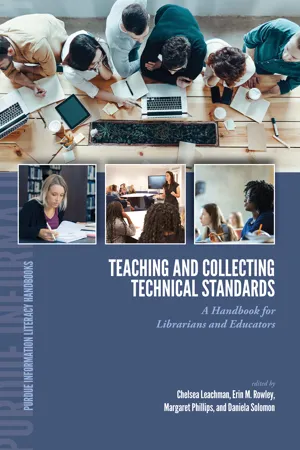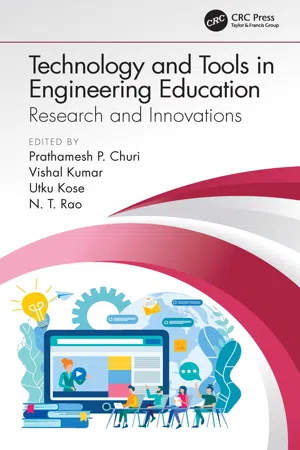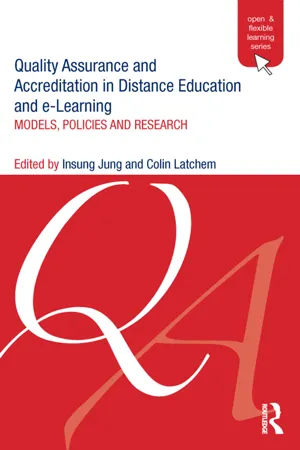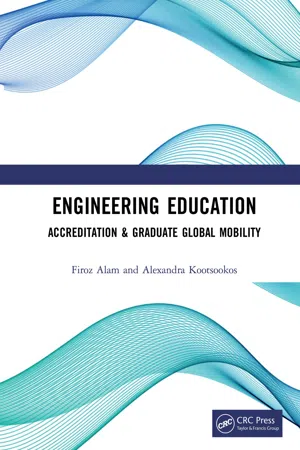Technology & Engineering
Accreditation
Accreditation refers to the process of evaluating and officially recognizing the competence, credibility, and quality of educational programs, institutions, or professionals. In the field of technology and engineering, accreditation ensures that academic programs meet specific standards and produce graduates who are well-prepared for their careers. It provides assurance to students, employers, and the public that the education provided meets established criteria.
Written by Perlego with AI-assistance
Related key terms
1 of 5
11 Key excerpts on "Accreditation"
- eBook - ePub
Teaching and Collecting Technical Standards
A Handbook for Librarians and Educators
- Chelsea Leachman, Erin M. Rowley, Margaret Phillips, Daniela Solomon(Authors)
- 2023(Publication Date)
- Purdue University Press(Publisher)
ISO created a freely available read-through module for professionals to everyday citizens interested in understanding standards basics, standards development, the ISO standards system, the benefits of standards, and consumer participation in the standards process. At the end of each section, there are self-assessment review questions. The module takes about a half-day to complete and includes many additional resources for users to return to later.SUMMARY
Above are select educational resources to assist in either personal education or use within the classroom. The resources range from basic information for new standards users to continuing education for professionals. New resources will continue to become available from standards developing organizations, academic institutions, or individuals through feedback from users and the identification of developing needs.Passage contains an image
9
Standards in Engineering and Engineering Technology
Margaret Phillips, Purdue UniversityINTRODUCTION
Engineering and engineering technology educators teach students about standards to meet Accreditation requirements and to prepare students for their next steps after graduation. In industry, new hires utilize standards on the job and may even participate in the creation of standards by representing their companies on standards developing committees. In this section, I examine Accreditation options for engineering and engineering technology programs in the United States and explore how standards appear in the Accreditation language, both directly and indirectly. Additionally, I introduce employer expectations of new hires with regard to standards knowledge.Accreditation AND CURRICULUM REQUIREMENTS
ABET Accreditation
ABET, formally known as the Accreditation Board for Engineering and Technology, is a major accrediting body of engineering, engineering technology, computing, and applied and natural science programs [1 ]. Currently, ABET accredits over 4,300 programs in 41 countries [2 ]. Many engineering and engineering technology students pursue degrees from ABET-accredited programs in order to qualify for future jobs [3 ], to meet graduate school admission preferences [4 ], and to fulfill the eligibility requirements of professional licensure [5 ]. ABET distinguishes “engineering” and “engineering technology” by a program’s curricular focus and the career paths of its graduates [6 - eBook - PDF
- Abdulla Y. Al-Hawaj, Wajeeh Elali, E.H. Twizell, Abdulla Y. Al-Hawaj, Wajeeh Elali, E.H. Twizell(Authors)
- 2008(Publication Date)
- CRC Press(Publisher)
In the USA, it is stated that accredita-tion is the means of self-regulation and peer review adopted by the educational community. The 74 accrediting process is intended to strengthen and sustain the quality and integrity of higher educa-tion, making it worthy of public confidence and minimizing the scope of external control. The extent to which each educational institution accepts and fulfils the responsibilities inherent in the process is a measure of its concern for freedom and quality in higher education and its com-mitment to striving for and achieving excellence in its endeavours (CHE-MSA, 1994). Accreditation assures quality as stated by ABET, 2007. In the United States, Accreditation is a non-governmental, peer review process that ensures educational quality. Educational institutions or programmes volunteer to undergo this review periodically in order to determine if certain criteria are being met. It is important to understand, however, that accredi-tation is not a ranking system . It is simply assurance that a programme or institution meets estab-lished quality standards. There are two type of Accreditation: Institutional and Specialized. Institutional Accreditation evaluates overall institutional quality. One form of institutional Accreditation is regional Accreditation of colleges and universities. Specialized Accreditation examines specific programmes of study, rather than an institution as a whole. This type of Accreditation is granted to specific programmes at specific levels. Architecture, nursing, law, medicine, and engineering programmes are often evaluated through specialized Accreditation. In the United States, ABET, Inc., is responsible for the specialized Accreditation of educational programmes in applied science, computing, engineering, and technology. Thus ABET Accreditation is an assurance that a college or university programme meets the quality standards established by the profession for which it prepares its students. - eBook - ePub
Technology and Tools in Engineering Education
Research and Innovations
- Prathamesh P. Churi, Vishal Kumar, Utku Kose, N. T. Rao, Prathamesh P. Churi, Vishal Kumar, Utku Kose, N. T. Rao(Authors)
- 2021(Publication Date)
- CRC Press(Publisher)
Komives, 2015 ). The challenges in terms of philosophical differences between Indian and USA Accreditation that needs to be addressed are curriculum, faculty, and facilities. This is one of the prominent reasons behind the prospect of substantial unemployment, despite high corporate demand for their services. However, the engineers from developed countries also confront problems in its continued ability to attract and retain top engineering talent from abroad due to various problems related to immigration uncertainties and growing economic opportunities in their native country. The quality of graduates which is going to play a decisive role in innovation and entrepreneurship needs to be addressed at all policy levels. The Accreditation activity increases the active engagement in their learning; ensures higher and qualitative interaction with instructors with immediate and meaningful feedback on their work from the instructor. There are certain advantages of participation in these international accords, e.g., it opens the opportunities regarding studying abroad, travel opportunities through international students exchange programs, more involvement in engineering design competitions, emphasis on programs through openness to diverse ideas and people.Accreditation is a statement of meeting the minimum requirements which are voluntary and the programs which are known for academic excellence may not choose to be accredited. The process of Accreditation is understood as a formal recognition of an educational program by a designated agency based on an assessment of quality for a given duration. In this process, representative committee from the designated agency is invited which examines an educational program to ensure that it is meeting minimum standards established by experts in the field and industry through an evaluation process. This process results in terms of two outputs either the said program is accredited or not accredited. In the Indian context, the rules of NBA were constituted under “Section 10 (u) read with section 10 (r) of the All-India Council for Technical Education (AICTE) act, 1987”. The regulations of 2015 onward require that all engineering programs attain the POs and demonstrate that they are following continuous improvement policies. The undergraduate and postgraduate programs offered at Higher Education Institutions (HEIs) need to get NBA accredited by 2022. The representation of India in WA is NBA. India holds the status of being permanent signatory status in WA since June 2014. The Tier-1 - eBook - ePub
- Steven L. Danver(Author)
- 2016(Publication Date)
- SAGE Publications, Inc(Publisher)
Kathy-ann Daniel-Gittens Kathy-ann Daniel-Gittens Kathy-ann, Daniel-GittensAccreditation Accreditation43 52Accreditation
This entry examines the purpose and process of higher education (HE) Accreditation, as it pertains to the Accreditation of both online and dual mode HE institutions in the United States and internationally. Accreditation is a voluntary process that HE institutions and programs undertake to affirm or certify that they meet established international, national, regional, or professional standards for academic quality. Academic quality is concerned with the policies, protocols, and indicators that institutions use to promote quality, accountability, and transparency in their operations and services. These criteria—quality, accountability, and transparency—are core standards that Accreditation agencies use to evaluate teaching and learning, student support services, business operations, resource utilization, and other activities within the scope of HE institutions.The U.S. Department of Education describes the goal of Accreditation as ensuring acceptable levels of quality in the operations of HE institutions. Accreditation that is granted to HE institutions and programs is not unlimited in scope nor is it for an unlimited period of time. Rather, Accreditation is given for a specific scope and granted for a specific period of time, after which institutions and programs must apply for a renewal of their Accreditation.Purpose of Accreditation
The major purpose of Accreditation is to provide assurance to parents, students, educators, employers, governmental agencies, and other stakeholders that individual HE institutions and programs meet externally validated standards of quality. For governments, an added benefit is that Accreditation assures that HE institutions are sound fiduciary stewards of student financial aid and research funding. Other less visible functions of Accreditation are the establishment of independently derived quality assurance (QA) standards for the operations of HE institutions and programs, the cultivation of a culture of self-regulation within the HE industry, and promotion of a process of continuous institutional improvement through peer review and self-monitoring based on industry benchmarks. - eBook - PDF
Higher Education in Asia/Pacific
Quality and the Public Good
- Terance W. Bigalke, Deane E. Neubauer(Authors)
- 2009(Publication Date)
- Palgrave Macmillan(Publisher)
Accreditation implies consequences for the institution itself (e.g., permission to grant diplomas) and/or for stu- dents (e.g., eligibility for employment or further studies). Accreditation asks: “are you good enough to be approved?” Typically, results are classified in several categories across measures stratified by relative excellence. Accreditation can be institutional or programmatic. Quality Assurance in the Indonesian Higher Education System The basis of quality assurance in the Indonesian higher education system is the basic law on the National Education System (Law no. 20/2003) and other government regulations derived from this law. One of the derivatives is the Higher Education Long Term Strategy 2003–2010 (HELTS). The goals of the HELTS are to improve national competitiveness, the quality of graduates, research and community/public service; and to measure institu- tional (organizational) health. Three strategic goals were set to carry out the HELTS: (1) improvement of the relevance, quality, and academic atmosphere of HEIs; (2) establish- ing geographical and social equity; and (3) improvement of higher educa- tion management (leadership, efficiency, effectivity, sustainability). To carry out HELTS, a new paradigm of higher education management was introduced consisting of four elements. (1) Institutions would experience M. K. Tadjudin 154 increased autonomy along with greater public accountability; (2) these changes would take place simultaneously with the establishment of internal quality assurance systems by the institutions; (3) this would interface with a new external quality assurance/Accreditation system; and (4) that would result in public accountability of higher education institutions. In the context of the new paradigm, Accreditation performs the func- tion of external quality assurance as part of public accountability by assess- ing higher education institutions. - eBook - ePub
Quality Assurance and Accreditation in Distance Education and e-Learning
Models, Policies and Research
- Insung Jung, Colin Latchem(Authors)
- 2012(Publication Date)
- Routledge(Publisher)
Accreditation is a process of assessment and review by an Accreditation or certification body which enables an institution, programme or course of study to be recognized or certified as meeting certain required standards. The endowment of Accreditation is binary: an institution, a course or a programme either receives or does not receive Accreditation. However, minimum standards usually apply and the pass/fail nature of Accreditation is often softened by the provision of probationary periods and opportunities to reapply for Accreditation. While Accreditation methods and purposes are similar to audit and other forms of external review, they require applicants to prove their suitability by fulfilling the Accreditation criteria, while auditing presumes the institution is functioning appropriately, and the external review is responsible for proving otherwise.Accreditation is an increasingly popular form of performance model, particularly in European higher education. It is used in countries such as the United Kingdom and Sweden as a mechanism to upgrade providers such as colleges and polytechnics to university status. Government Accreditation agencies also become more prevalent in countries with a burgeoning private higher education sector, for example in Eastern Europe and some Asian countries. In the United States, Accreditation agencies are self-regulated and independent of the Federal and State Governments. The various agencies have established their own QA regulations and performance funding requirements but these are found to be generally ineffective in strengthening institutional processes for academic quality (Dill, 2003). Charged with recommending a national strategy for reforming post-secondary education, the Report of the Commission appointed by Secretary of Education Margaret Spellings – the Spellings Commission (US Department of Education, 2006) – signalled the US Federal Government’s intention to use institutional Accreditation as an aggressive QA tool, but this has been strongly resisted, despite persistent attempts from the current administration (Gallagher, 2010) (see also Chapter 6 - eBook - PDF
- Cesar Caceres(Author)
- 2012(Publication Date)
- Academic Press(Publisher)
The applicant could be able to choose either of the two as a major test unit, and the other could then become the minor. The duration of the initial certifica-tion may be 5 years or more, with a reAccreditation procedure to be made available to those whose initial certification has expired. Also, reAccreditation should be on a periodic basis. The basis for instituting a reAccreditation procedure concerns the freshness of the accredited individual's experience. In a technical specialty, one quickly loses one's expertise if the skills are not used and expanded by that use. Thus, if accredi-tation is to be a useful process for the engineer and his employers or clients, it must be timely. Legal registration is an indicator of general professional qualification, at one point in time, while the Accreditation certificate is an indicator of the present possession of certain specialized qualifications. The cost of maintaining the entire Accreditation system (including the cost of designing, validating, administering, and grading any necessary written exam-inations) should be defrayed partially by fees charged to the applying engineers and partly by grants from the participating professional and technical societies. Grants should also be accepted from employing organizations on a general basis, that is, not identified with any particular applicant. 14 CURRENT CONCEPTS A Zara The surge in technology after World War II led to new programs encompassing engineering and medicine that, in turn, required new types of engineers such as clinical engineers. Practicing this technology requires a complete and coordinated system of training and employment. Many of the participants in the system will, of course, see only the subsystems or their individual interfaces. The system, however, involves three major steps. One step, education, has immediate feedback control requiring the supplier institution to be accredited. - eBook - ePub
Engineering Education
Accreditation & Graduate Global Mobility
- Firoz Alam, Alexandra Kootsookos(Authors)
- 2020(Publication Date)
- CRC Press(Publisher)
133 ]. Through national and international benchmarking, Accreditation allows different nations to recognise engineering qualifications of substantial equivalence. This means that graduates of accredited programs have global mobility without the need for reassessment. Thus, a graduate in Australia of a program accredited by EA is able to practise engineering to the same level in all jurisdictions of the signatories of the Washington Accord. While this benchmarking process is the primary function of Accreditation, as accredited qualifications are established, the IEA, which administers the Washington Accord, also becomes a forum within which the best practice of engineering education is disseminated. The Accreditation process is typically based on an assessment of learning outcomes.EA not only assists Australian higher education institutions by accrediting and assuring quality of engineering programs designed to prepare graduates for entry to professional practice, it also provides graduates with professional development activities for progression to Registration and Chartered levels. EA also provides similar services to engineering associates and engineering technologists.3.4.1.2 The basis of the Accreditation process
EA’s engineering program Accreditation is an evidence-based evaluation process to determine if educational programs meet the defined outcomes of its stage 1 competency standards for the bachelor of engineering professional level. The EA stage 1 competency standards (elements) are threshold standards. The Accreditation under EA Stage 1Competencies assures that an engineering program is suitably designed and delivered to prepare graduates for entry into professional practice in a specified engineering field. The EA Accreditation exercise is undertaken in an international, as well as local, context, upholding the spirit of the Washington Accord and other professional agreements. EA engages directly and consults with all major stakeholders, including the Australian Council of Engineering Deans, Tertiary Education Quality and Standards Agency (TEQSA), IEA, Australian Industry Skills Committee and Australian Skills Quality Authority. - eBook - ePub
Quality Assurance in Higher Education in Eastern and Southern Africa
Regional and Continental Perspectives
- Peter Neema-Abooki(Author)
- 2021(Publication Date)
- Routledge(Publisher)
Shabani et al., 2014 ). These factors inevitably had an impact on funding in higher education, and quality suffered.Quality assurance initiatives at the national level
Current developments such as massification, privatisation, marketisation, diversification, institutional restructuring, emerging modes of delivery, accountability demands, globalisation, corruption and academic fraud have prompted governments of several countries to establish national higher education quality assurance agencies (Garwe and Gwati, 2018 ). The result of the rapid expansion and diversification of the higher education sector is that academic quality has come under greater scrutiny (Hoosen et al., 2017 ). Although still at different stages of development, several countries by now have set up Accreditation bodies, initially mainly for accrediting private higher education institutions, and later also for accrediting public higher education programmes and institutions (Hoosen et al., 2017 ).Two complementary but different approaches to quality assurance were introduced in higher education in the 1980s, namely Accreditation and academic evaluation/assessment/audit. Accreditation refers to the process of determining the extent of meeting standards set by governments, national agencies or professional bodies, is mainly externally driven, and can be applied to programmes, academic units or the whole institution. Academic evaluation/assessment/audit is undertaken by governments or national agencies and professional bodies, such as in medical education. This may be applied to the whole or part of the institution, and uses the fitness for purpose approach, that is: Is the institution achieving its own set objectives and standards? This involves preparing an institutional self-assessment report which is reviewed by a panel of external assessors who undertake a site visit and submit a report on their findings. The objective is development and enhancement, but in some countries such evaluation is linked to accountability and public funding. Internationally evaluation processes currently are used widely. Both Accreditation and evaluation processes are important for improving quality in African higher education institutions (Kisanga and Machumu, 2014 ; Shabani et al., 2014 - eBook - ePub
Laboratory Accreditation and Data Certification
A System for Success
- Carla H. Dempsey, Jimmie D. Petty(Authors)
- 2020(Publication Date)
- CRC Press(Publisher)
They state that Accreditation, by convention, has been applied to organizations such as laboratories and that certification should be associated with individuals. They further recognize that the word certification is currently used most often in describing laboratories. They suggest that the term Accreditation is not universally defined, but one definition is “the process of verification by competent individuals that a laboratory possesses the capability for providing precise and accurate data on a day-to-day basis and that the data can be routinely relied upon to meet data quality objectives.” Accreditation has been described by a spokesperson and quality assurance professional 11 in charge of quality assurance for a national network of laboratories as “Accreditation programs have been established to provide a measure of assurance to the users of environmental data, whether they be the regulators or those being regulated, that the laboratory producing the data is qualified to generate that data.” Further suggested is that no Accreditation programs currently in operation actually provide a framework for assuring overall data quality. Then suggested is that a national certification program that provides certain reportable elements to the end-user of the data would better meet the stated goals of the Accreditation definition. • Accreditation has been described by a polarized light microscopy (PLM) professional 12 as one means to “take some of the guesswork out of selecting a PLM laboratory.” He adds that there are other practical considerations that are needed in the selection of a laboratory - Sankara Narayana Rao Gedala, P. L. Saranya, Sankara Narayana Rao Gedala, P. L. Saranya(Authors)
- 2021(Publication Date)
- Bentham Science Publishers(Publisher)
The numbers of HEIs are increasing rapidly, due to huge increases in the global population and demands of accessing quality education. Aspirants/students are traveling to global destinations to acquire what they consider to be the best education. Many parents and students are taking educational loans to seek the best career through a globally-recognized degree. In many countries, students’ debts are also increasing year on year. In such a scenario, the biggest question that arises is how to ensure that an institution offers the best education, since every HEI claims that they are the best. Accreditation and ranking are tools that seek to ensure the quality of curriculum, faculty, research, infrastructure and learning resource, learning outcomes and students’ success rates. Accreditation is the process to ensure that an HEI is complying at least with the minimum requirements, while the outcomes/results of applied processes, policy guidelines and various strategic plans are measured through rankings. Research and Patents which are highly emphasized both in Accreditation and rankings exhibit the amount of intellectual work and academic reputation of an institution. It is no exaggeration in saying that Accreditation and rankings are perceived as quality stamps in higher education that defines level of excellence.Availability of reliable, consistent, and authentic data is a primary requirement for Accreditation and rankings and ICT plays a vital role in this area. Using ICT, symmetry can easily be maintained in the data. For example, a student’s data entered by the admissions department can be utilized by teaching faculty, non-teaching staff, the examination department, a student’s support department, and so on, without repeating the same entries again and again. In each Accreditation and ranking, data of the last 3–5 years is required. Keeping such data in huge volumes without redundancy and in a form to compute for further analysis and to present in various formats as prescribed by different accrediting and ranking bodies is difficult if this is done without applying appropriate ICT. Therefore, leveraging ICT in data management as per requirements, i.e. criteria/standards of various accrediting and ranking bodies, leads an HEI towards achieving excellence in higher education. Many accrediting and ranking bodies have already developed frameworks for their respective Accreditation and rankings, e.g
Index pages curate the most relevant extracts from our library of academic textbooks. They’ve been created using an in-house natural language model (NLM), each adding context and meaning to key research topics.










